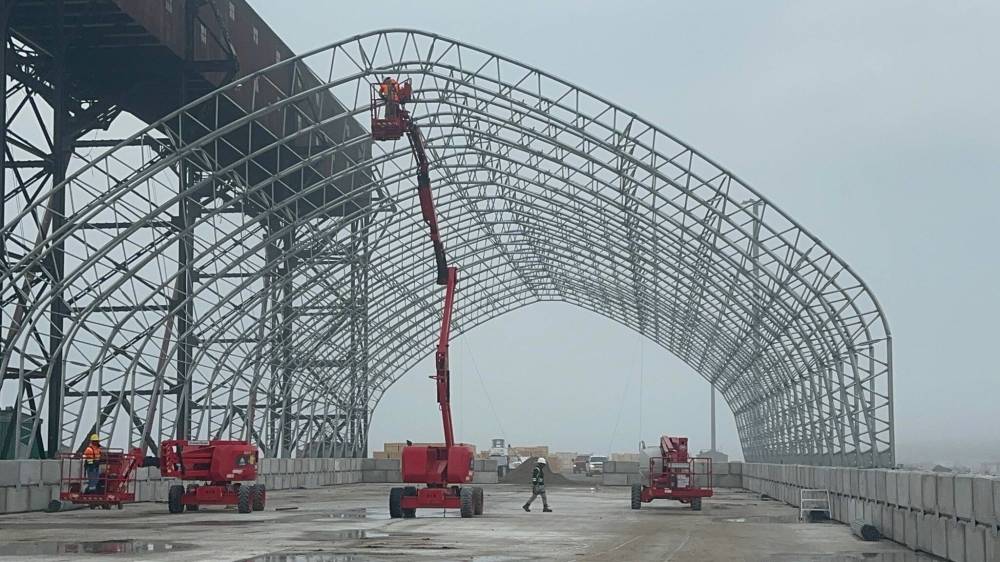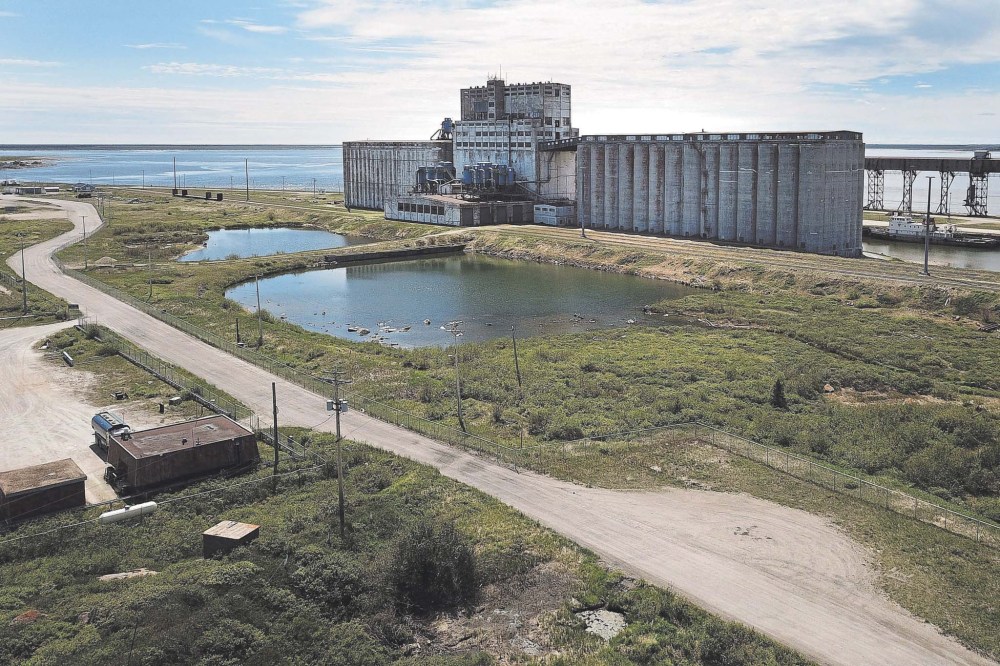Arctic Gateway Group touts upgrades to northern railway, Port of Churchill
Read this article for free:
or
Already have an account? Log in here »
To continue reading, please subscribe:
Monthly Digital Subscription
$0 for the first 4 weeks*
- Enjoy unlimited reading on winnipegfreepress.com
- Read the E-Edition, our digital replica newspaper
- Access News Break, our award-winning app
- Play interactive puzzles
*No charge for 4 weeks then price increases to the regular rate of $19.00 plus GST every four weeks. Offer available to new and qualified returning subscribers only. Cancel any time.
Monthly Digital Subscription
$4.75/week*
- Enjoy unlimited reading on winnipegfreepress.com
- Read the E-Edition, our digital replica newspaper
- Access News Break, our award-winning app
- Play interactive puzzles
*Billed as $19 plus GST every four weeks. Cancel any time.
To continue reading, please subscribe:
Add Free Press access to your Brandon Sun subscription for only an additional
$1 for the first 4 weeks*
*Your next subscription payment will increase by $1.00 and you will be charged $16.99 plus GST for four weeks. After four weeks, your payment will increase to $23.99 plus GST every four weeks.
Read unlimited articles for free today:
or
Already have an account? Log in here »
The Hudson Bay Railway and Port of Churchill are doubling the number of weekly freight trains and tripling storage capacity of critical minerals at Canada’s only deepwater Arctic port.
“It’s about making sure Churchill is ready to serve Canadians as a major Arctic hub for trade and supply,” said Arctic Gateway Group CEO Chris Avery, the head of the company that’s owned by 29 First Nations and the northern communities it serves.
“The country is actively exploring how we build and secure projects of national importance, and the Port of Churchill is very much part of that conversation.”
New federal legislation fast-tracks infrastructure projects deemed to be in the “national interest” after U.S. President Donald Trump upended that country’s reliable trading relationship with Canada.
SUPPLIED Last summer, rail cars carried 10,000 tonnes of zinc concentrate to the port — marking the first shipment of a critical mineral from Churchill in more than 20 years. This year, they planned to double that amount.
Premier Wab Kinew has lobbied for one of those projects to be in Manitoba, and supports an energy and critical minerals trade corridor to Hudson Bay.
Fox Lake Cree Nation’s subsidiary, NeeStaNan, proposes to build an Arctic port south of Churchill, at Port Nelson, to export liquefied natural gas and other products to Europe.
When asked if he’s concerned about another port becoming an option in Manitoba, Avery pointed to the benefits of the Churchill location: its port is open for business, the town has infrastructure and services, including a hospital, a 9,200-foot runway that can accommodate any size aircraft, and a rail line that connects the port to the rest of North America.
The first Arctic supply ship of the season was being loaded with essential goods, building material and construction equipment Tuesday, destined for the Kivalliq region of Nunavut, he said.
“I’m sure that there are lots of people in the Kivalliq region today who are waiting for their brand-new trucks and vehicles.”
The port has tripled the size of its storage facility for critical minerals and other bulk material, and is being upgraded to diversify the goods it can handle and increase shipping traffic.
He said Arctic Gateway Group has a long-standing relationship with Kivalliq communities and partnerships in place for expanded growth.
They’re establishing a reliable transportation corridor for Canada’s North that serves the trade, transportation, and security needs of a changing Arctic, he said.
The addition of a second weekly freight train is more than just a schedule change, Avery said.
“It reflects the fact that the railway is in the best condition that it’s been in for over 25 years.”
The rail line was sold to Americans, who then refused to repair it after flooding in 2017 washed out sections of rail bed. It was purchased by northern communities that rely on it, and has required governments to invest millions of dollars to get it in good shape.
New technologies, including drone surveillance, ground-penetrating radar and AI-driven data analysis “are helping us monitor conditions in real time and take actions before problems emerge,” said Avery.
First Nations back another Hudson Bay port
Ahead of Prime Minister Mark Carney’s Indigenous summit Thursday, a group of 10 Manitoba First Nations formally expressed support for a proposed energy trade corridor to ship liquefied natural gas from Port Nelson on Hudson Bay.
“Nation-building projects that will fall under the purview of the One Canadian Economy Act offer tremendous opportunities for our First Nations,” Chemawawin Cree Nation Chief and Assini Group Inc. president Clarence Easter said in a news release.
Ahead of Prime Minister Mark Carney’s Indigenous summit Thursday, a group of 10 Manitoba First Nations formally expressed support for a proposed energy trade corridor to ship liquefied natural gas from Port Nelson on Hudson Bay.
“Nation-building projects that will fall under the purview of the One Canadian Economy Act offer tremendous opportunities for our First Nations,” Chemawawin Cree Nation Chief and Assini Group Inc. president Clarence Easter said in a news release.
“This is why we formally support the development of a trade route and utility corridor to Hudson Bay, in full partnership with Fox Lake Cree Nation, NeeStaNan, and other interested Treaty 5 and 6 Nations, as a means of advancing economic self-determination, regional prosperity, and sustainable development.”
NeeStaNan has received federal approval to explore exporting liquefied natural gas, and proposes building a transport facility at Port Nelson, south of Churchill.
The Assini Group Inc. First Nation partners include Bunibonibee Cree Nation, Chemawawin Cree Nation, Norway House Cree Nation, Nisichawayasihk Cree Nation, Opaskwayak Cree Nation, God’s Lake Narrows First Nation, Marcel Colomb Cree Nation, Mosakahiken Cree Nation, Mathias Colomb Cree Nation and Fox Lake Cree Nation.
“We have been moving forward to establish economic development in our communities and we see this summit as a first conversation with the Government of Canada to unlock the potential that exists for our communities, our elders and our youth,” Easter said.
The news release followed an Arctic Gateway Group news conference Tuesday, touting investments and upgrades in its Hudson Bay Railway and Port of Churchill for shipping bulk commodities, such as critical minerals and supplies to the Kivalliq region of Nunavut.
“Both sites show they could have good potential, noting they deal with separate market opportunities,” said Robert Parsons, a supply chain expert who teaches at the University of Manitoba.
He said Arctic Gateway Group is focused on what Churchill has done and can do, acting as an export point for a range of bulk-solid products, including grains, potash, and mineral ore concentrates, which it has experience handling.
It’s also a supply and distribution point for goods to communities on the Hudson Bay coast, including Nunavut. It could serve as an export point to international markets for critical minerals where Canada — which has lagged behind other countries in developing them — has an advantage.
“(It) will depend on solid, economically viable critical-mineral projects in the region and on their associated business cases,” said Parsons, who has master degrees in business administration and chemical engineering.
Churchill, he said, is not really suitable for gaseous or liquid export products, especially anything classified as dangerous goods. It does act as a distribution point for fossil fuels like gasoline, diesel and propane, but in distribution quantities, not export quantities.
— Carol Sanders
The port has tripled the size of its storage facility for critical minerals and other bulk material, and is being upgraded to diversify the goods it can handle and increase shipping traffic, the CEO said.
“We’re also in talks with other organizations about potentially storing other materials in that facility — whether it’s things such as phosphates coming from Europe or potash coming from the south,” he said.
Last summer, rail cars carried 10,000 tonnes of zinc concentrate to the port — marking the first shipment of a critical mineral from Churchill in more than 20 years. This year, they planned to double that amount, Avery said.
“I think we’ve unloaded something like 60 carloads of zinc concentrate already in Churchill and there’s more on the way.”
Wildfires in northern Manitoba this summer have put a crimp on shipments from Hudbay Minerals’ Snow Lake mine, which had to close temporarily owing to mandatory evacuations.
“Those are headwinds for us, but those are really short-term things,” Avery said. “We’re working with our partners to meet their needs and… we expect to be there for them as they continue to produce critical minerals,” he said.
“This is a big deal for Manitoba, Nunavut and Western Canada — regions rich in mineral resources that the world needs,” said Avery.
“Churchill is ready to be part of Canada’s critical mineral solution, helping producers move their product to markets efficiently and reliably.”
carol.sanders@freepress.mb.ca

Carol Sanders
Legislature reporter
Carol Sanders is a reporter at the Free Press legislature bureau. The former general assignment reporter and copy editor joined the paper in 1997. Read more about Carol.
Every piece of reporting Carol produces is reviewed by an editing team before it is posted online or published in print — part of the Free Press‘s tradition, since 1872, of producing reliable independent journalism. Read more about Free Press’s history and mandate, and learn how our newsroom operates.
Our newsroom depends on a growing audience of readers to power our journalism. If you are not a paid reader, please consider becoming a subscriber.
Our newsroom depends on its audience of readers to power our journalism. Thank you for your support.











